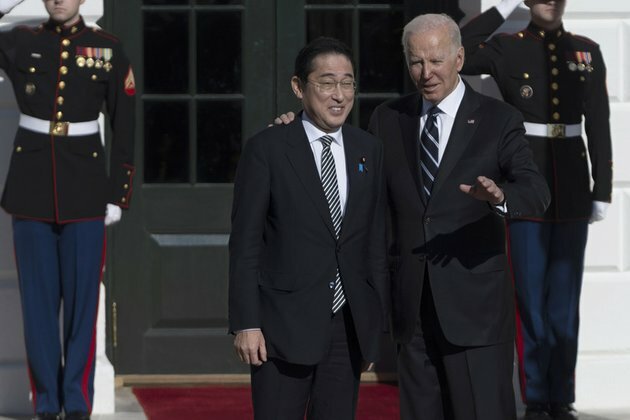What can China do in response to NATO's foray into Asia
RT.com
08 May 2023, 19:43 GMT+10

The Western military bloc is reportedly opening its first office in Japan as the US pushes ?bloc confrontation? politics into the region
Japan is reportedly planning to open a NATO liaison office in Tokyo. The office will be the first of its kind in Asia, and is designated to "coordinate" with the alliance on security matters, and on the issue of China.
It is no secret that the US seeks to expand and institutionalize the military alliance into Asia and place its footprint on a global scale, a notion that has been encouraged by the conflict in Ukraine, and called for by many senior Western figures. This shows that the organization has long discarded its original purpose, and has become a tool of hegemony and domination, far from the so-called 'defensive' alliance that it once claimed to be, over one specific geographic area of the globe.
The administration of US President Joe Biden is arguably the most militarily aggressive US presidency in decades, even more so than the George W. Bush presidency given the circumstances. Biden has ramped up tensions with larger powers, as opposed to merely conducting smaller regime change operations after the horrors of 9/11. In doing so, Biden has aggressively sought to expand alliances such as NATO, creating new mechanisms such as AUKUS, brought Europe to the brink of war with Russia, and is going to place new nuclear weapons on the Korean Peninsula. While the previous president, Donald Trump, sought to downsize NATO and make it more financially self-reliant, the Biden administration is unapologetically attempting to 'globalize' it.
NATO, the North Atlantic Treaty Organization, was once designed as a mechanism for collective regional self-defence amongst a fragile post-World War II Western Europe, which was equal in power to the Warsaw Pact. Following the end of the Cold War, after the US became the undisputed hegemon, NATO was transformed from a mere balance-of-power-focused military alliance into a tool for enforcing American interests and security objectives. In doing so, the US sought to transition the alliance into a 'permanent order of things' and betrayed promises to post-Soviet Russia that it would not expand it eastwards.
But now, as the US increasingly sees China as its largest adversary, it wants to 'globalize' NATO into Asia and interlock it with existing US alliances in the region, including Japan, South Korea, the Philippines, and Australia. Traditionally, the US has only ever pursued these alliances on a 'bilateral scale', this has typically been more manageable to US interests as Asian nations do not operate on the same universality as Western European countries, and are more fraught with nationalist conflict. For example, South Korea has little political space to cooperate with Japan. Although President Yoon Suk-yeol is attempting to do so, his ratings are sliding thanks to his perceived capitulation to Tokyo.
Despite this, the US wants to make these alliances multilateral. Even if it cannot officially expand NATO, it believes that its clout can still be increased if intelligence, armaments, and other forms of cooperation are strengthened. Hence, while not all of NATO can come running to Taiwan's help if a conflict with mainland China breaks out, the US likely aims to create a 'coalition' which will cooperate in the same way as the one supporting Ukraine, i.e., providing a never-ending supply of arms, intelligence, logistics, operational support, and so on. In other words, NATO would wage war against China by proxy in the same way it has against Russia in Ukraine, whether the US is directly involved or not. This of course severely raises the military stakes of the region.
So what can China do to respond to this attempt at 'alliance encirclement' against it? First, it can strengthen its ties with Russia and aim to create a deeper balance of power in the Asia-Pacific. Secondly, it can revitalize old alliances and strengthen its ties with North Korea as a military partner. After all, the DPRK is still obligated by the 1961 treaty of mutual assistance to come to China's aid in a war and can be used to contain Japan and South Korea. Thirdly, it can look to build new military partnerships with regional countries who feel similarly threatened by US expansionism; for example, Laos, Cambodia, and Myanmar. While the rest of ASEAN are likely to stay neutral, including Malaysia, Indonesia, Singapore, Thailand, and Vietnam (excluding the US-aligned Philippines), China should work to improve its relationships with these countries in order to prevent the US from trying to 'force' them to choose.
The expansion of NATO influence into Asia ultimately poses a threat to the stability, security, and certainty of an entire region. Driven by the US, it strives to import 'bloc confrontation' politics into the region and upend its integration so that it might be able to secure US hegemony over it. China faces the challenge of balancing its security interests amidst this turmoil, while also ensuring that a conflict does not break out. Either way, the entire region is locked in an increasingly tense arms race amidst the foreign policy of the Biden administration, which can only be described as hegemonic, expansionist, and aggressive.
(RT.com)
 Share
Share
 Tweet
Tweet
 Share
Share
 Flip
Flip
 Email
Email
Watch latest videos
Subscribe and Follow
Get a daily dose of Japan Herald news through our daily email, its complimentary and keeps you fully up to date with world and business news as well.
News RELEASES
Publish news of your business, community or sports group, personnel appointments, major event and more by submitting a news release to Japan Herald.
More InformationAsia Pacific
SectionChinese homeowners slash prices amid resale glut
BEIJING, China: Homeowners in China are slashing prices to attract buyers as a growing number of resale properties flood the market....
Toyota partners with Waymo to advance self-driving car tech
TOKYO, Japan: Toyota is taking a fresh step toward autonomous driving by teaming up with Waymo to co-develop new vehicle platforms...
China's factory activity shrinks at fastest pace in over a year
BEIJING, China: China's manufacturing sector lost steam in April, with activity shrinking at the fastest pace in over a year, as new...
Australian police and partners smashing drug cartels
Every day, police across Australia investigate thousands of incidents—any one of which could unlock a major case on the other side...
Australia inflation hits 3-year low, boosting rate cut hopes
SYDNEY, Australia: A key measure of inflation in Australia has cooled to its lowest level in three years, lending weight to expectations...
Hong Kong home prices fall for fourth month despite stimulus
HONG KONG: Hong Kong's housing market continued to lose ground in March, with home prices falling for a fourth straight month despite...
Business
SectionChinese homeowners slash prices amid resale glut
BEIJING, China: Homeowners in China are slashing prices to attract buyers as a growing number of resale properties flood the market....
Toyota partners with Waymo to advance self-driving car tech
TOKYO, Japan: Toyota is taking a fresh step toward autonomous driving by teaming up with Waymo to co-develop new vehicle platforms...
U.S. stocks finish with modest losses Monday
NEW YORK, New York - U.S. stocks were volatile Monday as the focus remained on tariffs, and the perceived lack of trade deals despite...
Amazon expands rural delivery network by investing $4 billion
SEATTLE, Washington: Amazon.com is ramping up its delivery game in rural America, announcing a US$4 billion investment to grow its...
Starbucks boosts staffing, slows automation push
SEATTLE, Washington: Starbucks is shifting course on its store strategy—putting people ahead of machines. The coffee giant announced...
China's factory activity shrinks at fastest pace in over a year
BEIJING, China: China's manufacturing sector lost steam in April, with activity shrinking at the fastest pace in over a year, as new...










